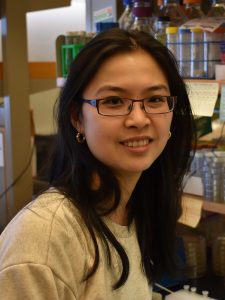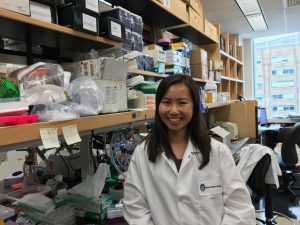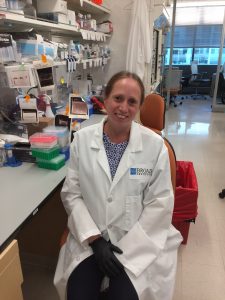2018 Grantees
 Mary Jane Tsang Mui Ching, Ph.D., Whitehead Institute for Biomedical Research, is in the laboratory of Iain Cheeseman, Ph.D. Drugs that block cell division are among the most effective therapeutics used during cancer chemotherapy. These so-called anti-mitotic drugs are commonly used as first line therapies against a wide spectrum of human cancers, including difficult-to-treat cancers such as ovarian and lung cancers. However, patient responses vary greatly, with some patients responding well to treatment, but others showing no improvement due to drug resistance. Her work seeks to understand the molecular determinants that underlie these differences in patient response to allow for more effective choices for cancer therapy in a patient-specific manner. Mary Jane has uncovered a novel regulatory mechanism that extends the existing paradigm of how the spindle assembly checkpoint regulates mitotic exit. The goal of this work is to reveal novel avenues for the diagnosis, control, and treatment of various types of human cancers.
Mary Jane Tsang Mui Ching, Ph.D., Whitehead Institute for Biomedical Research, is in the laboratory of Iain Cheeseman, Ph.D. Drugs that block cell division are among the most effective therapeutics used during cancer chemotherapy. These so-called anti-mitotic drugs are commonly used as first line therapies against a wide spectrum of human cancers, including difficult-to-treat cancers such as ovarian and lung cancers. However, patient responses vary greatly, with some patients responding well to treatment, but others showing no improvement due to drug resistance. Her work seeks to understand the molecular determinants that underlie these differences in patient response to allow for more effective choices for cancer therapy in a patient-specific manner. Mary Jane has uncovered a novel regulatory mechanism that extends the existing paradigm of how the spindle assembly checkpoint regulates mitotic exit. The goal of this work is to reveal novel avenues for the diagnosis, control, and treatment of various types of human cancers.
Dr. Tsang Mui Ching received her B.A. in Chemical-Biological Engineering and Biology from the Massachusetts Institute of Technology and her Ph.D. in Biological and Biomedical Sciences from Harvard University.
Dr. Tsang Mui Ching is the Hope Funds for Cancer Research Sakonnet Fellow
 Sharon M. Louie, Ph.D., Boston Children’s Hospital, is in the laboratory of Carla F. Kim, Ph.D. Lung cancer remains the leading cause of cancer-related mortalities in the United States. One strategy that may improve lung cancer therapy targets the tumor-propagating cell (TPC) population. The proposed work has significant potential to improve lung cancer treatment by understanding two aspects of lung cancer that are not yet applied as conventional therapeutic targets – cancer metabolism and tumor-propagating cells. The majority of studies have focused on the disparity between whole tumor and normal tissues. However, solid tumors such as lung cancers are heterogeneous, where the bulk of the tumor consists of highly differentiated and proliferative cells. Most therapies currently target these cells that make up the bulk of the tumor, rather than TPCs, which represent a small population of the tumor, but is the most aggressive cells that have regenerative potential. This research program will identify metabolic vulnerabilities unique to TPCs, thus revealing potential therapeutic targets that are likely overlooked during whole tumor analyses. TPCs are attractive therapeutic targets as they can potentially reduce lung cancer recurrence and metastases, which account for the majority of lung cancer patient mortality.
Sharon M. Louie, Ph.D., Boston Children’s Hospital, is in the laboratory of Carla F. Kim, Ph.D. Lung cancer remains the leading cause of cancer-related mortalities in the United States. One strategy that may improve lung cancer therapy targets the tumor-propagating cell (TPC) population. The proposed work has significant potential to improve lung cancer treatment by understanding two aspects of lung cancer that are not yet applied as conventional therapeutic targets – cancer metabolism and tumor-propagating cells. The majority of studies have focused on the disparity between whole tumor and normal tissues. However, solid tumors such as lung cancers are heterogeneous, where the bulk of the tumor consists of highly differentiated and proliferative cells. Most therapies currently target these cells that make up the bulk of the tumor, rather than TPCs, which represent a small population of the tumor, but is the most aggressive cells that have regenerative potential. This research program will identify metabolic vulnerabilities unique to TPCs, thus revealing potential therapeutic targets that are likely overlooked during whole tumor analyses. TPCs are attractive therapeutic targets as they can potentially reduce lung cancer recurrence and metastases, which account for the majority of lung cancer patient mortality.
Dr. Louie received her B.A. in Molecular Toxicology from the University of California, Berkeley and her Ph.D. in Metabolic Biology from the University of California, Berkeley.
Dr. Louie is the Hope Funds for Cancer Research Grillo-Marxuach Family Fellow
 Yaara Oren, Ph.D., The Broad institute and Harvard Medical School, is in the laboratories of Aviv Regev, Ph.D and Joan Brugge, Ph.D. Despite a good initial response to chemotherapy, ovarian cancer comes back in the majority of patients and leads to death within five years of diagnosis. When the cancer first comes back, it may still be responsive to chemotherapy in many cases before eventually becoming drug resistant. Several mechanisms have been suggested to contribute to the disease coming back but we don’t know exactly how and how much each of these mechanisms impact the process. In Dr. Oren’s work, she is trying to uncover and understand the factors that contribute to the re-emergence of ovarian cancer that is still responsive to chemotherapy, by using a new method that allow her to trace how individual single cells respond to multiple rounds of chemotherapy. This novel tracing technique makes it possible to study how an ovarian cancer cell’s past behavior and pedigree affect its ability to survive drug treatment. Her work combines several techniques including microscopy, sequencing, mathematical modeling and patient data to expose not only what makes cells resistant to initial treatment but also what effects their ability to regenerate the tumor. We believe that this unique methodology will help identify which genes and cellular pathways are important for relapse. The insights gained from this integrated approach will help devise new drug therapies that delay or even prevent the emergence of resistant ovarian cancer.
Yaara Oren, Ph.D., The Broad institute and Harvard Medical School, is in the laboratories of Aviv Regev, Ph.D and Joan Brugge, Ph.D. Despite a good initial response to chemotherapy, ovarian cancer comes back in the majority of patients and leads to death within five years of diagnosis. When the cancer first comes back, it may still be responsive to chemotherapy in many cases before eventually becoming drug resistant. Several mechanisms have been suggested to contribute to the disease coming back but we don’t know exactly how and how much each of these mechanisms impact the process. In Dr. Oren’s work, she is trying to uncover and understand the factors that contribute to the re-emergence of ovarian cancer that is still responsive to chemotherapy, by using a new method that allow her to trace how individual single cells respond to multiple rounds of chemotherapy. This novel tracing technique makes it possible to study how an ovarian cancer cell’s past behavior and pedigree affect its ability to survive drug treatment. Her work combines several techniques including microscopy, sequencing, mathematical modeling and patient data to expose not only what makes cells resistant to initial treatment but also what effects their ability to regenerate the tumor. We believe that this unique methodology will help identify which genes and cellular pathways are important for relapse. The insights gained from this integrated approach will help devise new drug therapies that delay or even prevent the emergence of resistant ovarian cancer.
Dr. Oren received her B.A. and Ph.D. from Tel-Aviv University.
